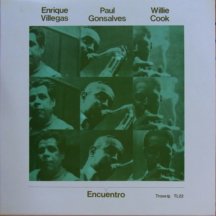 Encuentro Catalyst CAT-7913 1977 LP & TROVA TL-22 1989 LP Recorded 15th September 1968 - Argentina |
Personnel
Paul Gonsalves - Tenor Saxophone Willie Cook - Trumpet Enrique Villegas - Piano Alfredo Remus - Bass Eduardo Casalla - Drums |
Track Listing
1. Perdido (Ellington & Tizol) 2. I Cover The Waterfront (Green & Heiman) 3. Blues For B. A. (Gonsalves) 4. St. Louis Blues (Handy) 5. Gone With The Wind / Tenderly / Ramona (Wrubel & Magidson / Laurence & Gross / Gilbert & Wayne) 6. Just Friends (Klenner & Lewis) 7. I Can't Get Started (Gershwin) |
The great enthusiasm demonstrated by the audience at every concert was emotional that Ellington was really overwhelmed, while veteran Harry carney what could only compare it with audiences he experienced during the band's first visit to England in 1933. Perhaps this welcome should not have been such a surprise…after all, South America had long wanted to hear the greatest jazz musician jazz had ever produced. Through newspapers, the radio and records the public knew well Ellington's work and their incredible welcome moved him to explain how the concerts would be an inspiration for the rest of his life.
The orchestra and the music that he presented were, as always, a delightful combination of the new and the old. Famous familiar tunes were played such as Black and Tan Fantasy, Creole Love Call and The Mooche. There were his timeless stars, sax giants, Johnny Hodges and Harry Carney. There were also new numbers in the repertoire such as BP Blues, Eight o'clock Rock and South American Sunshine and new faces in the orchestra like Harold Ashby and Jeff Castleman. Willie Cook was also there, joining the orchestra again at the beginning of the tour, after a few years absence. To this informal recording session with an Argentina rhythm section Paul Gonsalves chose Cook as his partner. The session was important because it was the first time Cook had done any recording in many years. As this record beautifully illustrates, Cook's sensitive muted trumpet style was a marvellous contrast to the imaginative and gifted saxophone of Gonsalves
Paul Gonsalves enjoyed the enthusiasm of audiences the tour, not only for his brilliant solos but also for his great personality offstage. In Brazil, his knowledge of Portuguese made him the principle interpreter the band. In Argentina, he was always surrounded by groups of admirers, among whom he made many friends, having long and lively conversations.
When Alfredo Radoszynski suggested Paul record for TROVA with Enrique Villegas, Paul was thrilled with the idea. This would be an opportunity to express his gratitude for all the friendship he had been offered on the tour. The first tune suggested for the session was “Just Friends”, a title of special significance for this occasion. The same could be said of his blues number, composed especially for this occasion…."Blues for B.A". It expressed the regret felt by all the band at having to leave Buenos Aires after the concerts.
Two days after the band left Argentina it was playing in Nassau, before a mostly American audience. Although the audience was very attentive, that special spark of enthusiasm found in South America was missing here. “Do you notice the difference?”, musicians asked each other during the show. This was, of course, not a criticism but only reflected the American's' more relaxed attitude toward jazz and its jazz stars as a result of much more exposure to them. A prophet simply respected in his own country might very well be highly revered in other lands..even if what he preaches is music! There lies the difference between the South American and European audiences and those of the United States.
In Enrique Villegas, Argentina had a spontaneous, unpredictable pianist, who strongly exemplified one of Ellington's musical principles…freedom of expression. His ability to amaze us is evident throughout this record. The long, vibrant, well-chosen notes of Alfredo Remus were also a constant inspiration to Paul. "I was listening to him all night" said Gonsalves when the session ended around midnight. The tempo and precise drumming of Eduardo Casalla provided the base without which no quality jazz interpretations could be built.
In short, this record is proof that jazz was and still is an international language, a language, transcending all geographical limits, reaffirming that all men are indeed brothers. This concept is certainly an important axiom in the philosophy of Paul Gonsalves…one of this century's greatest jazz musicians but also one of the greatest of human beings.